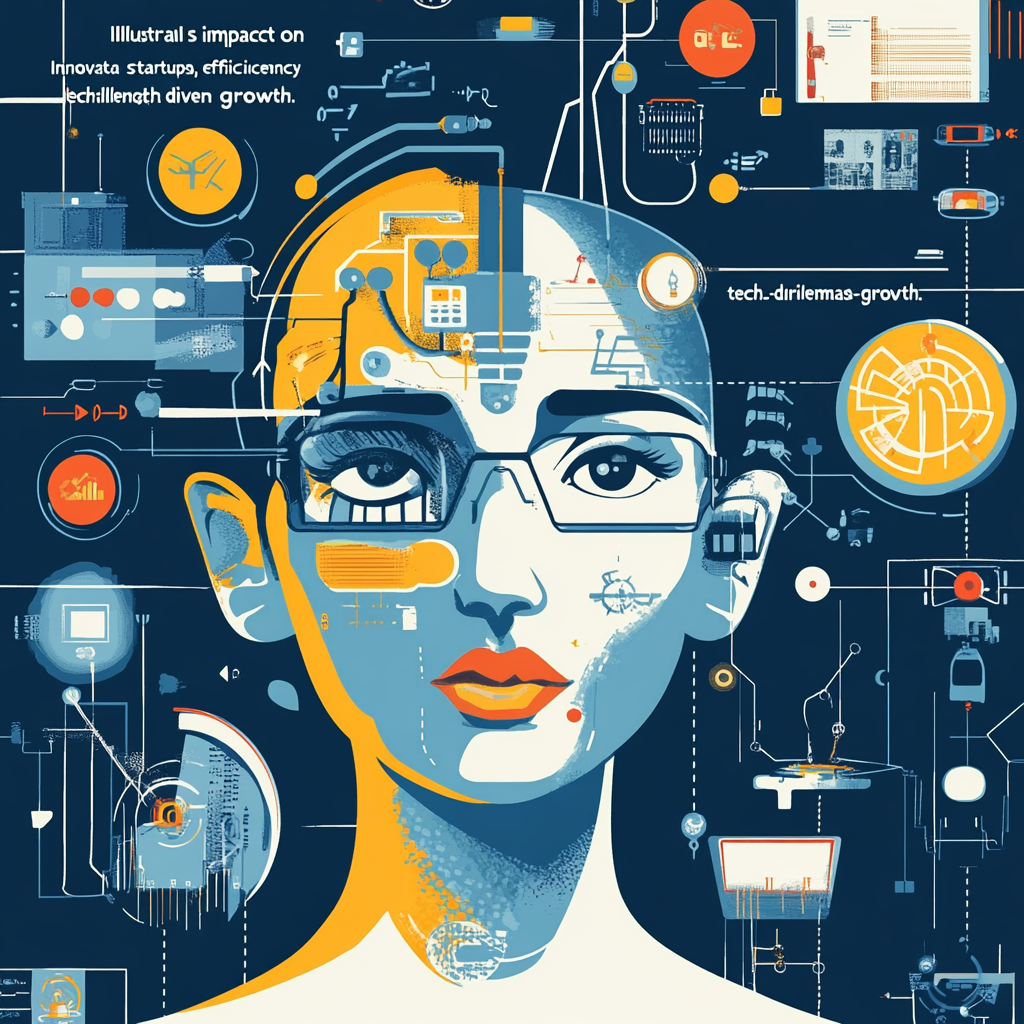
AI’s Double-Edged Sword: How It’s Revolutionizing Indian Startups While Raising Ethical Red Flags
The AI Awakening: Transforming India’s Startup Landscape and Treading the Ethical Tightrope
Picture a world where Indian startups have turned into juggernauts, harnessing artificial intelligence like a wizard wielding a magic wand. Decision-making is brisk, customer engagement goes beyond the ordinary, and operational efficiencies reach stratospheric heights. Sounds magnificent, doesn’t it? However, lurking behind the glorious façade of innovation are complex ethical dilemmas that are more than just paper tigers. They threaten to scratch the surface of what could otherwise be a remarkable success story. So, let’s dive into the exhilarating journey of AI in India’s startup ecosystem while facing the ethical music that accompanies it.
AI: The Fuel for Indian Startup Growth
The Indian startup scene is buzzing with potential, with AI leading the charge like a superhero in a flashy blockbuster. Let’s break down the noteworthy contributions of AI to this vibrant realm:
1. Data-Driven Decisions: The Fortune Teller of Business
Data isn’t just numbers; it’s the essence of informed decision-making. Startups like Byju’s are mastering this art, creating tailored educational experiences based on machine learning insights. On the other hand, fintech innovators analyze customer habits to craft personalized financial products, wielding predictive analytics like a true crystal ball of commerce[1]. This isn’t merely about efficiency—it’s about staying three steps ahead of the competition while they’re still stuck in traffic.
2. Customer Engagement: Where AI Becomes a Best Friend
Who doesn’t love a good conversation? Well, with AI-powered chatbots in Indian hospitality, companies like OYO Rooms and MakeMyTrip are redefining customer interactions by providing 24/7 assistance and tailored travel recommendations. Now, a chatbot isn’t merely a technical tool; it’s becoming a friend that remembers your preferences, thus strengthening customer loyalty[1]. You’ve got to appreciate the magic in turning fleeting clicks into enduring relationships.
3. Operational Efficiency: The Mechanization of Mundane
How many times have you wished someone would take care of the nitty-gritty for you? Enter AI and automation, swooping in like a superhero to save logistics startups such as Delhivery and Rivigo. These AI algorithms work tirelessly, optimizing delivery routes and slashing operational costs while letting humanity focus on moving the world forward[3]. Forget heavy infrastructure; cloud-based AI platforms allow startups to compete with corporate titans without the budgetary pinch.
4. Innovation: Where Magic Meets Reality
In the world of HealthTech, startups like Niramai are pushing boundaries, employing AI for early cancer detection, while AgriTech players like CropIn are utilizing precision farming to skyrocket crop yields[1]. These groundbreaking innovations are not just tech gimmicks; they are real-life solutions that tackle significant challenges head-on, creating entirely new markets in the process.
5. Competitive Edge: Winning the AI Race
With investors flocking to DeepTech startups (over 50% of funding deals now involve AI[2]), EdTech platforms like Vedantu are leveraging AI to personalize educational journeys, positioning themselves as leaders in an oversaturated market[1]. It’s a thrilling arms race where those who embrace AI effectively don’t merely survive—they flourish.
The Ethical Quagmire: Challenges Lurking Beneath the Surface
While the bountiful benefits of AI are enticing, the ethical dilemmas are as heavy and complex as your cousin’s wedding playlist. Let’s unravel these ethical tightropes:
1. Data Privacy: The Unseen Dragon
Startups amassing oceans of customer data must tread carefully. The reality is a compromised dataset can sink a nascent company faster than a cheap ship at sea. With regulations like the Digital Personal Data Protection Act emerging, scrutiny is intensifying. Finding the right balance is crucial[1][3].
2. Talent Shortage: The Scarcity Challenge
But wait; who’s going to build these fantastic AI systems? The tech industry is facing a skills gap like no other. Startups are elbowing their way into a global talent market teeming with tech titans eager to snatch skilled professionals[1][3]. This increasing demand drives up talent costs and throttles the pace of innovation—a double-edged sword that India must reckon with.
3. Algorithmic Bias: The Hidden Blemish
Can AI be fair? Well, not if it’s trained on flawed data. Case in point: biased algorithms in facial recognition can skew outcomes against marginalized communities. A simple audit of algorithms can reveal these biases, but it requires the joint forces of ethical considerations and technical know-how[3]. How do you ensure your AI doesn’t perpetuate stereotypes? The answer isn’t simple.
4. Governance: Who Keeps AI in Check?
As AI systems increasingly make autonomous decisions, questions of accountability start swirling. If an AI miscalculates a loan or a diagnosis, who takes the blame? Startups need robust governance frameworks to navigate these murky waters[1][3]. The time for ethical discussions is now, before accountability gets lost in the code.
5. The Generative AI Frontier: A Brave New World
Generative AI tools, such as those from Newron AI and Krutrim, open a Pandora’s box of challenges related to content authenticity and intellectual property concerns. Startups dabbling here must tread lightly to prevent AI-generated misinformation from turning into a digital wildfire[2].
The Path Forward: Merging Innovation with Ethics
The Indian startup ecosystem stands at a pivotal junction. With initiatives like the IndiaAI mission (which boasts a whopping budget of $1.25 billion for AI infrastructure[4]) and a burgeoning interest from over 500 institutional investors in DeepTech[2], the momentum is undeniable. However, the remarkable success hinges equally on confronting ethical challenges head-on:
- Collaborative Governance: Startups, government, and academic institutions must unite to set ethical AI guidelines. For instance, collaborating with entities like NASSCOM could establish industry-wide standards.
- Transparency in AI: Embedding a culture of transparency is vital. Startups should clarify how their AI systems operate, particularly in areas that impact consumers heavily, such as healthcare and finance.
- Investing in Talent: Addressing immigration policies or creating educational programs like those at IIT Kanpur or through Great Learning can help bridge the skills deficit.
As startups like DeepSeek unveil affordable AI models[4], showing innovation doesn’t necessitate lavish budgets, India’s burgeoning AI ecosystem stands poised to take a leap. What it requires is a steadfast commitment to ethical practices. That commitment could position India’s startups to emerge as global leaders rather than merely catching up.
Want to stay up to date with the latest news on neural networks and automation? Subscribe to our Telegram channel: @ethicadvizor

